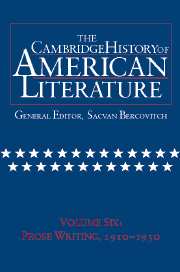Book contents
- Frontmatter
- Introduction
- A Cultural History of the Modern American Novel: Introduction
- 1 A Dream City, Lyric Years, and a Great War
- 2 Fiction in a Tme of Plenty
- 1 When the War Was Over: the Return of Detachment
- 2 The “Jazz Age” and the “Lost Generation” Revisited
- 3 The Perils of Plenty, or How The Twenties Acquired a Paranoid Tilt
- 4 Disenchantment, Flight, and The Rise of Professionalism in an Age of Plenty
- 5 Class, Power, and Violence in a New Age
- 6 The Fear of Feminization and The Logic of Modest Ambition
- 7 Marginality and Authority / Race, Gender, and Region
- 8 War as Metaphor: The Example of Ernest Hemingway
- 3 The Fate of Writing During the Great Depression
- Fictions of the Harlem Renaissance
- Ethnic Modernism
- Chronology
- Bibliography
- Index
4 - Disenchantment, Flight, and The Rise of Professionalism in an Age of Plenty
from 2 - Fiction in a Tme of Plenty
Published online by Cambridge University Press: 28 March 2008
- Frontmatter
- Introduction
- A Cultural History of the Modern American Novel: Introduction
- 1 A Dream City, Lyric Years, and a Great War
- 2 Fiction in a Tme of Plenty
- 1 When the War Was Over: the Return of Detachment
- 2 The “Jazz Age” and the “Lost Generation” Revisited
- 3 The Perils of Plenty, or How The Twenties Acquired a Paranoid Tilt
- 4 Disenchantment, Flight, and The Rise of Professionalism in an Age of Plenty
- 5 Class, Power, and Violence in a New Age
- 6 The Fear of Feminization and The Logic of Modest Ambition
- 7 Marginality and Authority / Race, Gender, and Region
- 8 War as Metaphor: The Example of Ernest Hemingway
- 3 The Fate of Writing During the Great Depression
- Fictions of the Harlem Renaissance
- Ethnic Modernism
- Chronology
- Bibliography
- Index
Summary
Some of the writers and artists who sailed for France or joined enclaves back home had read enough of Henri Murger’s Scènes de la vie de bohème to think of themselves as bohemian artists. Others, inspired by the example of Flaubert, longed to make the “quaint mania of passing one’s life wearing oneself out over words” their own. Joseph Hergesheimer, to take one example, became so enamored of Flaubert’s admonitions that he wrote, Edmund Wilson remarked, nearly as badly in a studied way “as Dreiser did in a crude one.” Others drifted from place to place, experimenting, or like Babbitt, moved in and out of bohemian enclaves as troubled or merely curious visitors. Lacking political edge, their discontent sometimes seems shallow. Even among those who shunned possessions and traveled light, serious commitment to reform politics remained rare. Cultural critics like Brooks, Cowley, and Wilson thought of themselves as “men of letters,” not academic critics. During the twenties, they remained for the most part present-minded, caught up in the literary scenes they wrote about. When they turned toward the past, they looked for writers who spoke to the stranded condition of their generation. By a “useable past,” they meant one useful to writers who wanted to continue culture. What held them together, beyond the abandonment of old restraints and a glamorization of new indulgences involving sex and alcohol as well as lavish parties, was a sense of shared predicament and common endeavor: their feeling that, paradoxically, they had been left alone together to experiment “in a void.”
- Type
- Chapter
- Information
- The Cambridge History of American Literature , pp. 134 - 141Publisher: Cambridge University PressPrint publication year: 2002

